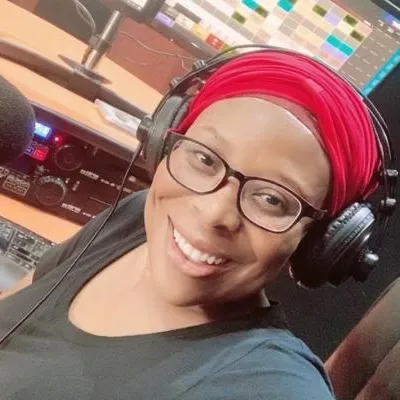
Karen, Zambia
How I got the diagnosis is still funny. We laugh about it because my friend, who’s also my gynaecologist, literally forced me to go and get screened. Not because there was anything wrong, but because after delivering my last baby nine or ten years earlier, I hadn’t been to see her. She kept asking me, and I’d say, I’m not sick. One day I was MC at a big hospital opening and her husband was in the audience. He came up and said, “Karen, today you’re coming for screening.” I thought, let me get them off my back.
When she started examining me, I saw her face change. I asked what was wrong. She asked if I was in pain. I wasn’t. Then she said I was bleeding. I thought she had hurt me, but she said, “There’s actually a growth on your cervix.” She did a pap smear and said it looked big and growing. Still, I didn’t think it was serious. She asked me to go to the cancer hospital. That’s when red flags went off. I called a friend who worked in the cervical cancer program. She told me where to go. I remember the cancer hospital being so cold—not temperature-wise, but the atmosphere. I saw people dying, in pain, crying. I started thinking, that’ll be me.
Tests confirmed it was cervical cancer. Fortunately, early stage. I was lucky. At the time, the system was strong—radiation machines, chemotherapy, brachytherapy all working. I did my treatment in two months. Looking back, I can’t say anything wasn’t done properly. Now, we have women waiting two or three years to start treatment. No radiation in the country. They have to go to Tanzania or wait for government sponsorship. Over a thousand people are waiting. It’s become very expensive.
Teal is the colour for cervical cancer. I started as a Facebook movement. I didn’t want to use my name. When I heard the colour was teal, I thought of Teal Sisters. That’s how the name came. I knew very little about cervical cancer. I thought, if someone like me who’s exposed doesn’t know much, what about women in villages or without phones? I started the page one evening. By morning, we had over 10,000 women asking questions. I was overwhelmed. I brought in my friend as an admin. Within a month we had 120,000 women.
We’d pick topics—symptoms, screening, treatment—and have live conversations. In the first quarter of 2020, more women got screened than the entire previous year. Health centres ran out of consumables. They called me saying, “Karen, you’ve created a problem.” But it was a good problem. Many lives were saved.
Someone told me to register it as a foundation to reach more people. Now, we canvass the country with advocacy messages. I pushed myself in and got onto the National Cancer Control Plan Committee. I sit on the education and information committee. I can now influence policy.
It’s very important to have a connection with your medical team. It assures you things will be okay. Most are diagnosed late, when it’s expensive and hard to treat. Still, connection from the start helps. I had the same doctor from start to finish. Others see a new doctor every visit. I had reactions during treatment—I could call her in the night. That kind of support improves outcomes. But where I come from, doctor-patient ratios are very high. I’d like patients to be in regular contact with their providers.
I never thought I’d do this. I was always on stage. After my diagnosis, everything changed. I did one more fashion week to prove I was okay. But soon after, I started the Facebook page and this became my life. I now travel the world, being a voice for the voiceless. When I was in treatment, I didn’t know anyone who had survived cervical cancer—only those who had died. I wanted to be that voice.
The first committee I sat on was for cervical cancer literature. Before, the material was from doctors’ eyes—not the patient’s. I gave it a human face. Now it’s more relatable. I described my symptoms and treatment—not what a doctor assumes we go through. Other countries—Kenya, Malawi, Rwanda—are also including survivor voices.
UICC is really important. Since working with them, I’ve collaborated with groups in other countries. We share best practices. I’ve learned from others and tailored their programs for my country. We’re part of the Patient Mentorship Programme. We talk about what’s working, what isn’t. At the World Cancer Congress, countries shared stories and we learned so much. UICC helps foster cross-country collaboration and improve survivorship. I’m honoured to be part of it.
When someone gets a cancer diagnosis, the first thought is, “I’m going to die.” Especially with cervical cancer, there’s stigma. Women choose to die in silence. Below-the-belt cancers are taboo. People point fingers, accuse you of promiscuity. I tell women: go through the emotions, don’t mask it—but remember, you can win this. You are not alone. Some say, “I’m not strong enough.” I say, sometimes strength is the only option you have. It’s not a death sentence. If caught early, you can be cured. Trust the process. Walk the journey. You can conquer.
Podcast, Let's Talk Cancer: https://www.uicc.org/news-and-updates/news/podcast-lets-talk-cancer-people-centred-care-and-power-patient-voice
YouTube video BBC Storyworks: https://www.youtube.com/watch?v=IQgnDH94LQo
